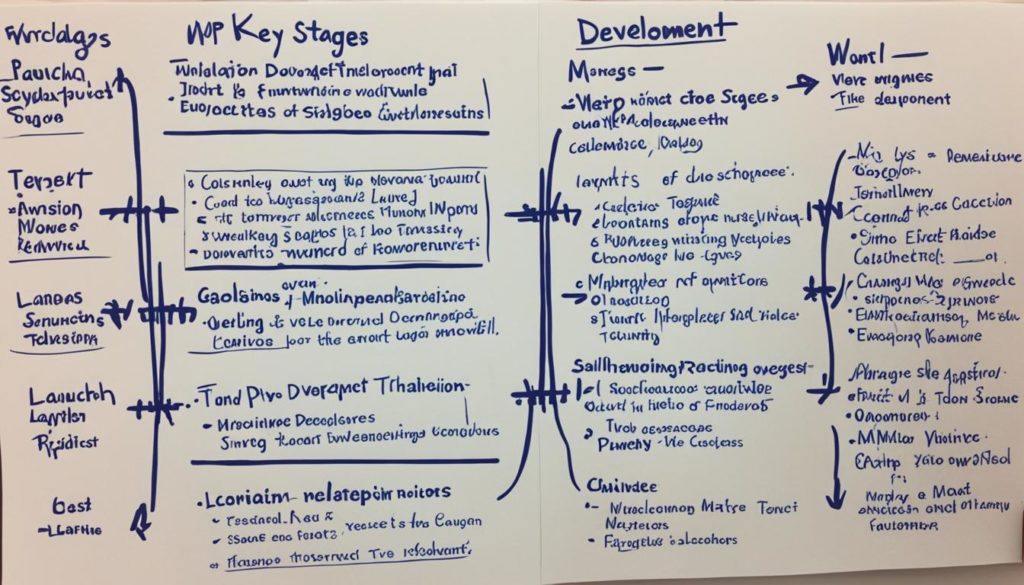
Did you know that, according to a 2023 McKinsey survey, 82% of organizations spend one or more days solving master data quality issues each week? This statistic shows how vital data management strategies are today.
Good data management is key for keeping data accurate, easy to access, and reliable. It includes data governance, data quality management, and master data management (MDM). It boosts efficiency, helps make better decisions, and ensures rules are followed. This makes it crucial for today’s businesses.
Key Takeaways
- McKinsey’s 2023 survey found that improving customer experience and increasing revenue through cross-selling are key objectives for MDM initiatives.
- Manual review of data quality issues consumes significant time, with 66% of organizations relying on this practice.
- 80% of organizations operate in silos, complicating effective data management strategies.
- Funding constraints and insufficient technological support are major challenges in implementing MDM initiatives.
- Only 16% of MDM programs receive organization-wide strategic funding, underscoring the need for more comprehensive support.
Now, let’s explore why data management is so important and how to master it. Whether you want to improve your organization’s data management or learn more about optimizing data insights, our guide is here to help.
Understanding the Importance of Data Management
In today’s digital landscape, managing data is key. Companies use data to create value and make smart decisions. They must handle data tasks like creating, accessing, and keeping it safe.
The Role of Data in Today’s Digital Landscape
Data is like money in our digital world. It drives innovation and keeps companies ahead. Companies use systems to manage data, turning it into a valuable resource.
Interestingly, 76% of organizations say data management is key for smart decisions. It’s at the heart of business strategies today.
Why Effective Data Management is Crucial
Good data management helps companies improve customer service and work better. It also drives new business ideas. For example, big data helps with product development and security.
Data governance is also important. It helps meet rules and keep data safe, which 70% of companies do. Autonomous databases use AI to automate tasks, making things simpler and cheaper.
Challenges Organizations Face
But, managing data isn’t easy. Companies face problems like data silos and keeping up with rules. They need strategies like data governance to overcome these.
Companies must stay quick and manage data well. This is especially true for new AI uses, like at Wimbledon 2023. Good data management turns data into a powerful tool for success.
The role of data management is huge. In a world where 91% of companies see it as a key advantage, it’s clear how important it is.
Data Quality: Ensuring Accuracy and Completeness
High data quality is key for good analytics and smart decisions. Good data management is crucial. It keeps data accurate and complete.
Data Quality Management Practices
Data quality management includes cleaning, validating, and enriching data. IBM says setting policies, training, and keeping records right are important. These steps help improve data quality.
- Data Cleansing: This fixes wrong or missing data, making it better.
- Data Validation: It checks data against standards, keeping it consistent.
- Data Enrichment: Adding more info makes data more useful and complete.
Addressing Data Incompleteness and Inconsistency
Data that’s not complete or consistent can cause big problems. IBM says bad data cost the U.S. $3.1 trillion in 2016. Fixing these issues is key.
Optum’s Data Quality Assessment Framework (DQAF) checks data for completeness, timeliness, validity, and consistency. This helps keep data quality high and operations smooth.
- Timely data is up-to-date and reliable.
- Consistent data across systems avoids mistakes.
- Complete data leads to better analytics and decisions.
Building a Single Source of Truth
A single source of truth is essential for consistent and accurate data. It means having one ‘golden record’ of the most reliable data. This unifies data views across departments.
Following standards like the IMF’s helps ensure data quality. A well-managed single source of truth supports good data governance. It’s a strong base for using data to succeed in business.
Good data quality avoids expensive mistakes, boosts efficiency, and aids in better decision-making. Gartner says bad data costs companies $12.9 million yearly.
Strategies for Effective Master Data Management (MDM)
Master Data Management (MDM) is key in today’s data world. It helps organizations make smart choices, work better, and stay ahead. Let’s explore the main ways to do MDM well.
Establishing Data Governance Policies
A good MDM plan starts with solid data governance policies. These rules guide how data is used, accessed, and kept safe. Good data governance means data is handled the same way everywhere and follows the law. Using data governance tools and regular checks are crucial.
Implementing MDM to Enhance Data Standardization
MDM makes data the same everywhere, making it reliable. Standardizing data means using the same formats and meanings. Cleaning, enriching, and checking data are key to having data you can trust.
Leveraging Technology for Data Integration
Data integration is a big part of MDM. It brings together data from different places into one view. This helps with analysis and making decisions. Tools like ETL help with this process. Keeping master data the same everywhere makes data more reliable and useful.
Ensuring Data Security and Compliance
Keeping data safe is very important in MDM. Using encryption, single sign-on, and regular checks are important steps. Companies like Gras Savoye use tools from Informatica to keep data safe and meet rules. This also helps with reporting on Environmental, Social, and Governance (ESG) issues.
Here is a look at some key parts of good Master Data Management:
| Aspect | Description |
|---|---|
| Data Governance | Setting policies, standards, and rules for data management, usage, and compliance. |
| Data Standardization | Ensuring uniform data formats and definitions for reliability and consistency. |
| Data Integration | Consolidating data from multiple sources for a unified view. |
| Data Security | Implementing measures to protect data from breaches and unauthorized access. |
Enhancing Organizational Efficiency through Data Management
Effective data management is key to making an organization more efficient. It streamlines data processes and sets up consistent practices. This helps cut down on mistakes and improves decision-making.
Reducing Redundancies and Errors
Companies with good data management see a 33% boost in efficiency. Getting rid of duplicate data and reducing errors are big steps. Using data quality checks can make data 20% more accurate.
Also, strong data security cuts down on security risks by 50%. This keeps data safe and reliable.
Optimizing Business Processes
Good data management also makes business processes better. It helps fight data silos and improves data flow. This saves employees up to two hours a day on data entry.
Scalable systems offer advanced analytics and integration. This can cut down on waste by 25%, making operations smoother.
Improving Decision-Making with Reliable Data
Having reliable data is crucial for making smart decisions. It helps with forecasting, risk management, and planning. For example, bad data costs U.S. businesses $600 billion a year.
Good data practices, like data catalogs, keep data safe from breaches. This way, organizations can make decisions that help them grow and become more efficient.
Conclusion
Mastering data management is key as data grows in volume, speed, and variety every year. We’ve looked at data architecture, quality, integration, and master data management. These areas show the need for strong systems and practices.
Companies that focus on strategic data management can make better choices, run smoother, and protect their data. This is crucial against breaches and unauthorized access.
Data management comes with its own set of challenges. We’ve talked about dealing with different data formats, the cost of keeping data quality, and the risks of bad decisions. But, with clear data definitions, strong governance, and advanced tools, these issues can be solved.
As data shapes business in every way, adopting these strategies is vital. It leads to better efficiency, compliance, and decision-making. Good data management boosts current operations and prepares for the future in our data-driven world.
By focusing on strategic data management, companies gain a big edge. They’re ready for changing market needs. This focus is essential for success in today’s data-rich environment.
FAQ
What is data management and why is it important?
Data management is about managing and using data well in an organization. It makes sure data is accurate, easy to get, and reliable. This is key for better work and smarter decisions.
How does data management enhance organizational efficiency?
Good data management cuts down on mistakes and makes work smoother. It helps all parts of the company work together well. This leads to better planning, risk handling, and strategy.
What challenges do organizations face in managing data?
Companies struggle with data being stuck in silos, poor data quality, and following rules. Using strategies like Master Data Management (MDM) and data governance helps overcome these hurdles.
What are data governance policies?
Data governance policies tell how data should be used in an organization. Having clear policies is key for managing data well, keeping data true, and following rules.
How does Master Data Management (MDM) improve data quality?
MDM makes data from different places into one, making it better. It ensures data is the same everywhere, which is important for good analysis and decisions.
Why is high-quality data essential for data analytics?
Good data is vital for analytics because it makes results trustworthy. Cleaning, checking, and enriching data makes it better. This leads to insights that can be acted upon.
What strategies can be used to integrate data effectively?
Using tools like ETL and data platforms helps mix data from various sources. This makes sure all data is the same and ready for use in analysis and decisions.
How do we ensure data security and compliance?
Keeping data safe involves strong security steps like encryption and access controls. Following rules means knowing data privacy laws and setting up policies to meet them.
Future App Studios is an award-winning software development & outsourcing company. Our team of experts is ready to craft the solution your company needs.










